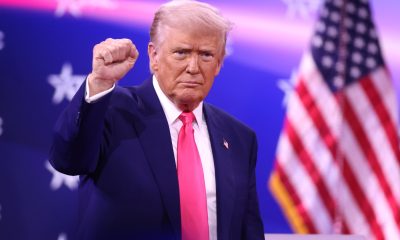Africa
Facing Unexpected Enthusiasm, Kenya Bans Worldcoin
The Kenyan government has decided to suspend Worldcoin in the country less than a week after its launch while waiting to learn more about how the company collects and uses the data from the scanned irises. This temporary ban was declared urgently in response to the overwhelming interest of numerous populations worldwide in the technology, which Sam Altman, the father of ChatGPT, partly developed.

The Kenyan government has decided to suspend Worldcoin in the country while waiting to learn more about how the company collects and uses the data from the scanned irises. On Wednesday, Kenya announced the suspension of the cryptocurrency Worldcoin, whose verification system is based on iris recognition, pending the results of investigations into the “security and protection of data” collected by the company.
To follow the latest Worldcoin developments, along with other breaking crypto news, download our free cryptocurrency news app.
Worldcoin Launch Met With Privacy Concerns
Launched in late June in Germany by OpenAI’s CEO Sam Altman, the Worldcoin system is also under investigation by European regulators, including those from France and Germany. Worldcoin is meant to become a type of digital passport operating through blockchain, allowing users to prove their identity online without sharing personal data. To obtain this digital passport, users must undergo an iris scan using an “orb,” a biometric device designed by Worldcoin.
On Wednesday, the Kenyan Ministry of Interior announced in a statement that they would “immediately suspend the activities of Worldcoin until the relevant public agencies certify the absence of any risk to the public.” This cryptocurrency has gained some success in this East African country, particularly amid sustained inflation.
$50 for an Iris Scan
On Tuesday, in the capital Nairobi, several thousand people queued up at shopping centers and the main conference center to undergo an iris scan and receive the equivalent of 7,000 shillings (45 euros) in virtual currency, as observed by an AFP journalist. Most individuals then immediately sold their “tokens.”
“Concerned about the activities (of Worldcoin) involved in registering citizens through the collection of data on the eye/iris globe,” the government stated that they have launched investigations.
Kenya to Investigate Legality of Project
These investigations aim to “ascertain the authenticity and legality of the activities, the security and protection of the collected data, and how the collectors intend to use the data.”
When contacted by AFP, Worldcoin had not yet responded to this suspension. This cryptocurrency is also under scrutiny by several European regulators and is currently not available in the United States, where authorities are attempting to better regulate this sector.
Worldcoin Deployed 1500 “Orbs” Worldwide
Worldcoin spent three years developing its project, and two million people signed up during the testing phase to obtain a digital passport called “World ID.” In April, BuzzFeed reported on the anger of some of these individuals who felt trapped by the company’s promises after agreeing to have their irises scanned. Alex Blania, co-founder of Worldcoin, admitted in an interview with the news site that communication could have been “better in some cases.”
Around 1500 “orbs” will be deployed worldwide to enable millions of other users to register, according to the Worldcoin website. The value of the “token,” initially $1.70, rose to $3.58 before falling back to $2.37, according to the CoinMarketCap website.
__
(Featured image by Steveman_shotz via Pexels)
DISCLAIMER: This article was written by a third party contributor and does not reflect the opinion of Born2Invest, its management, staff or its associates. Please review our disclaimer for more information.
This article may include forward-looking statements. These forward-looking statements generally are identified by the words “believe,” “project,” “estimate,” “become,” “plan,” “will,” and similar expressions. These forward-looking statements involve known and unknown risks as well as uncertainties, including those discussed in the following cautionary statements and elsewhere in this article and on this site. Although the Company may believe that its expectations are based on reasonable assumptions, the actual results that the Company may achieve may differ materially from any forward-looking statements, which reflect the opinions of the management of the Company only as of the date hereof. Additionally, please make sure to read these important disclosures.
First published in La Tribune. A third-party contributor translated and adapted the article from the original. In case of discrepancy, the original will prevail.
Although we made reasonable efforts to provide accurate translations, some parts may be incorrect. Born2Invest assumes no responsibility for errors, omissions or ambiguities in the translations provided on this website. Any person or entity relying on translated content does so at their own risk. Born2Invest is not responsible for losses caused by such reliance on the accuracy or reliability of translated information. If you wish to report an error or inaccuracy in the translation, we encourage you to contact us.

-

 Africa2 weeks ago
Africa2 weeks agoMorocco Charts a Citizen-Centered Path for Ethical and Inclusive AI
-

 Africa8 hours ago
Africa8 hours agoSurging Expenditures Widen Morocco’s Budget Deficit Despite Revenue Growth
-

 Markets1 week ago
Markets1 week agoSoybean Market Reacts to Trade Hopes, High Stocks, and Global Price Pressure
-

 Cannabis4 days ago
Cannabis4 days agoSwitzerland Advances Cannabis Legalization with Public Health Focus






















